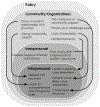The Influence of Rural Healthcare Systems and Communities on Surgery and Recovery: A Qualitative Study
- PMID: 36155272
- PMCID: PMC10473841
- DOI: 10.1016/j.jss.2022.08.028
The Influence of Rural Healthcare Systems and Communities on Surgery and Recovery: A Qualitative Study
Abstract
Introduction: Successful recovery after surgery is complex and highly individual. Rural patients encounter greater barriers to successful surgical recovery than urban patients due to varying healthcare and community factors. Although studies have previously examined the recovery process, rural patients' experiences with recovery have not been well-studied. The rural socioecological context can provide insights into potential barriers or facilitators to rural patient recovery after surgery.
Methods: We conducted semi-structured qualitative interviews with a purposeful sample of 30 adult general surgery patients from rural areas in the Mountain West region of the United States. We used the socioecological framework to analyze their responses. Interviews focused on rural participants' experiences accessing healthcare and the impact of family and community support during postoperative recovery. Interviews were transcribed verbatim and coded using content and thematic analysis.
Results: All participants commented on the quality of their rural healthcare systems and its influence on postoperative care. Some enjoyed the trust developed through long-standing relationships with providers in their communities. However, participants described community providers' lack of money, equipment, and/or knowledge as barriers to care. Following surgery, participants recognized that there are advantages and disadvantages to receiving family and community support. Some participants worried about being stigmatized or judged by their community.
Conclusions: Future interventions aimed at improving access to and recovery from surgery for rural patients should take into account the unique perspectives of rural patients. Addressing the socioecological factors surrounding rural surgery patients, such as healthcare, family, and community resources, will be key to improving postoperative recovery.
Keywords: General surgery; Postoperative recovery; Rural communities; Rural health systems; Rural surgery.
Copyright © 2022 Elsevier Inc. All rights reserved.
Figures
Similar articles
-
Access to CKD Care in Rural Communities of India: a qualitative study exploring the barriers and potential facilitators.BMC Nephrol. 2020 Jan 29;21(1):26. doi: 10.1186/s12882-020-1702-6. BMC Nephrol. 2020. PMID: 31996168 Free PMC article.
-
Heart Failure Care Facilitators and Barriers in Rural Haiti: A Qualitative Study.Ann Glob Health. 2024 Sep 25;90(1):60. doi: 10.5334/aogh.4521. eCollection 2024. Ann Glob Health. 2024. PMID: 39345843 Free PMC article.
-
A qualitative study of rural healthcare providers' views of social, cultural, and programmatic barriers to healthcare access.BMC Health Serv Res. 2022 Apr 2;22(1):438. doi: 10.1186/s12913-022-07829-2. BMC Health Serv Res. 2022. PMID: 35366860 Free PMC article.
-
Healthcare stakeholders' perceptions and experiences of factors affecting the implementation of critical care telemedicine (CCT): qualitative evidence synthesis.Cochrane Database Syst Rev. 2021 Feb 18;2(2):CD012876. doi: 10.1002/14651858.CD012876.pub2. Cochrane Database Syst Rev. 2021. PMID: 33599282 Free PMC article.
-
Rural Patient Experiences of Accessing Care for Chronic Conditions: A Systematic Review and Thematic Synthesis of Qualitative Studies.Ann Fam Med. 2022 May-Jun;20(3):266-272. doi: 10.1370/afm.2798. Ann Fam Med. 2022. PMID: 35606138 Free PMC article.
Cited by
-
Establishment and validation of an interactive web-based calculator for predicting postoperative functional recovery in metatarsal fracture patients: A LASSO regression model approach.PLoS One. 2025 Jun 3;20(6):e0323609. doi: 10.1371/journal.pone.0323609. eCollection 2025. PLoS One. 2025. PMID: 40460102 Free PMC article.
-
Retrospective Review of Pneumothorax Rates in a Rural, Micropolitan Area After Bronchoscopic Lung Volume Reduction.Chronic Obstr Pulm Dis. 2024 Sep 27;11(5):534-537. doi: 10.15326/jcopdf.2024.0502. Chronic Obstr Pulm Dis. 2024. PMID: 38942443 Free PMC article.
References
-
- Royse CF. The patient’s surgical journey and consequences of poor recovery. Best Pract Res Clin Anaesthesiol. 2018;32:253–258. - PubMed
-
- Evenson M, Payne D, Nygaard I. Recovery at home after major gynecologic surgery: how do our patients fare? Obstet Gynecol. 2012;119:780–784. - PubMed
-
- Holland DE, Mistiaen P, Bowles KH. Problems and unmet needs of patients discharged “home to self-care”. Prof Case Manag. 2011;16:240–250. quiz 251–242. - PubMed
-
- Kang E, Gillespie BM, Tobiano G, Chaboyer W. General surgical patients’ experience of hospital discharge education: a qualitative study. J Clin Nurs. 2020;29:e1–e10. - PubMed
Publication types
MeSH terms
Grants and funding
LinkOut - more resources
Full Text Sources
Medical


